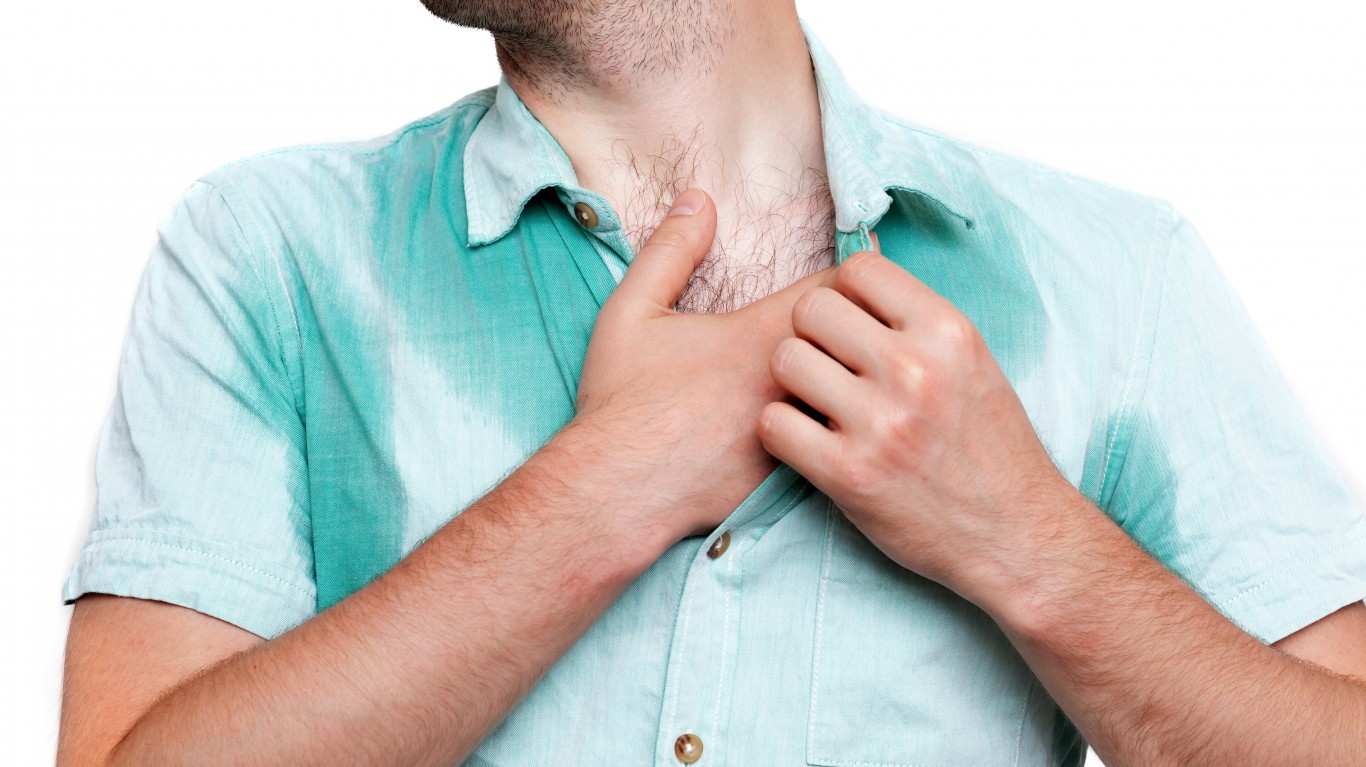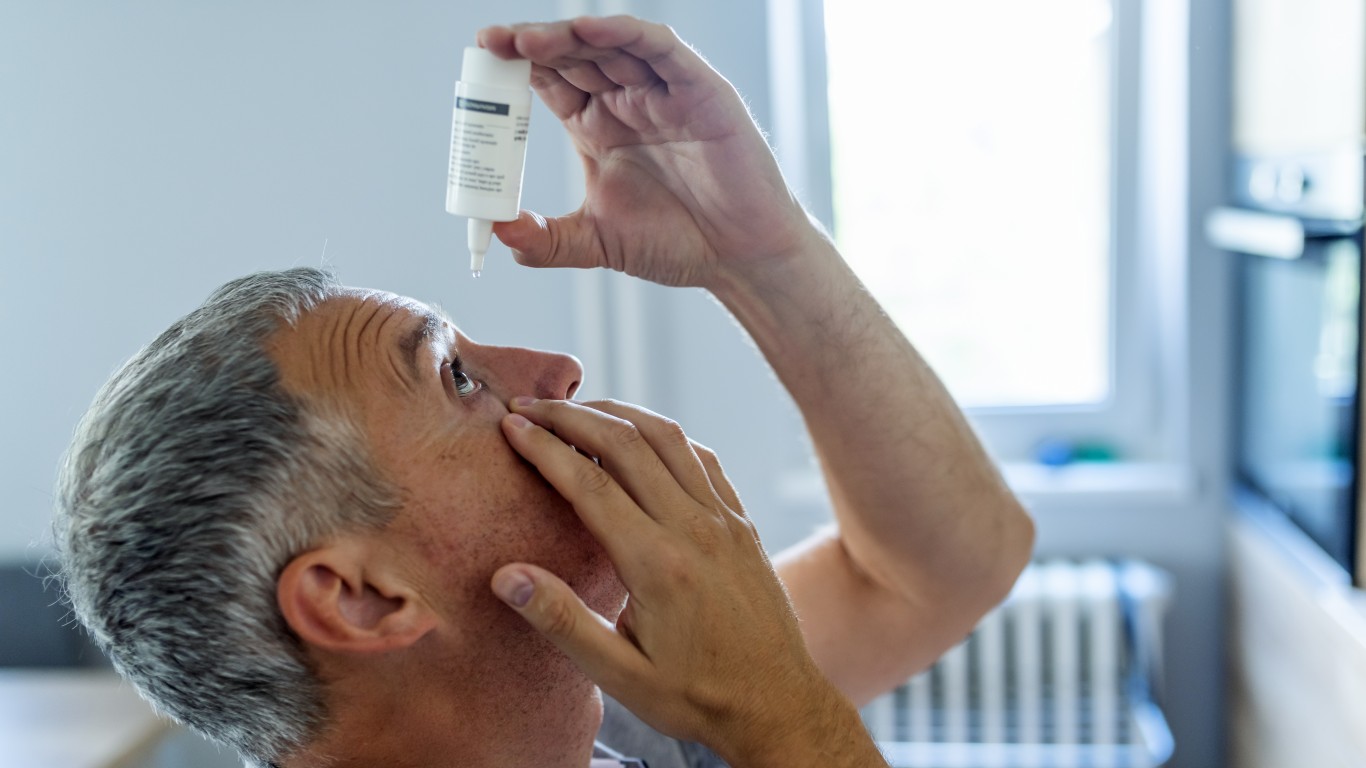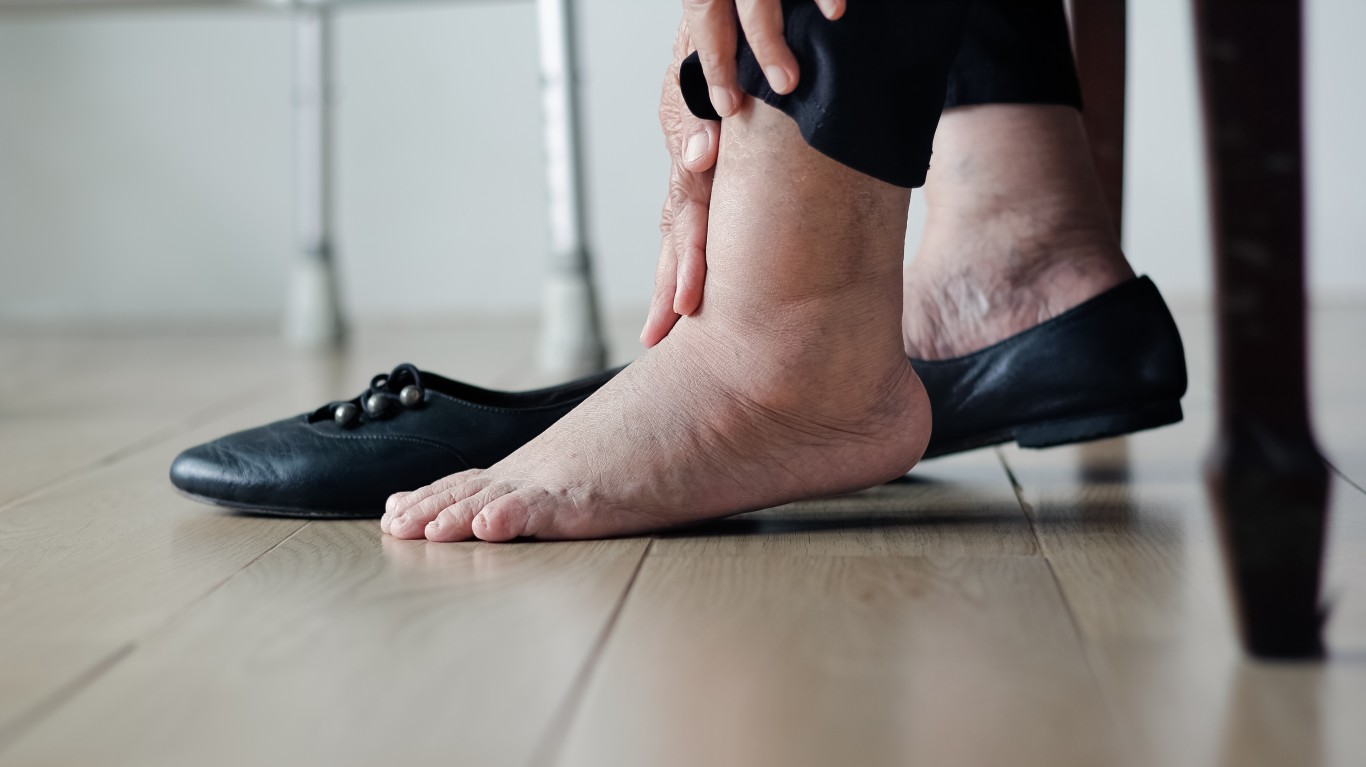
Most people know they have to head to the hospital if their chest hurts or if they can’t breathe. And they know they should get tested for COVID-19 if they have a fever, discomfort breathing, loss of taste or smell, or dry cough. These signs are practically impossible to ignore.
But there are seemingly trivial symptoms that are the body’s way of showing a person’s health may be compromised.
To create a list of 28 warning signs of underlying health problems, 24/7 Tempo reviewed scores of research papers, reviews of academic studies, and numerous sites that focus on health such as the Centers for Disease Control and Prevention, WebMD, and Mayo Clinic.
Some conditions people have for a long time — completely unaware. Most people rely on what they know about what’s normal to gauge the gravity of their symptoms. When it comes to behavior, however, sometimes even so-called normal behavior can wreak havoc on the body — here are 21 “harmless” habits that are actually aging you faster than you can imagine.
Many people already know that getting cravings even when they’re already full is a sign of junk food overconsumption, but remaining hungry after eating a meal can also indicate diabetes. Some habits are hard to recognize as being a sign of a potential health problem, especially if they have been part of our daily routine for years. But it never hurts to pay closer attention.

1. Spending a lot of money: Bipolar disorder
Impulsive overspending has been linked to bipolar manic episodes. If handling money well — including spending within limits — is a challenge, a manic episode may be the cause.
In such cases, a person may suddenly decide to go to China or spend thousands of dollars on art or tattoos. People affected by manic spending episodes often feel overconfidence, which leads to the brain basically silencing the voice of caution.
[in-text-ad]

2. Biting your nails: Depression or OCD
Nail biting, or onychophagia, is associated with anxiety and stress. The mere act of chewing on the cuticle, soft tissue surrounding the nail, and the nail itself, which, for most people, typically begins in childhood, relieves tension. This bad habit can be masking a mental health problem, such as depression.
Medical reviews suggest that 80% of children and more than 50% of parents who bite their nails have a form of a psychiatric disorder, mainly depression. In 2013, the American Psychiatric Association included severe nail biting in its Diagnostic and Statistical Manual as an obsessive compulsive-related condition.

3. Patches of darkening skin: Diabetes
When the pancreas makes insulin, but the body doesn’t use it properly, there’s a buildup of the hormone in the bloodstream. High levels of insulin in the blood can lead to epidermal skin cells reproducing quickly. Areas around the neck, armpits, and groin can become brown and sometimes even slightly raised.

4. Unexplained weight loss: Cancer
Weight loss is a common symptom in many cancers, but it’s more common in later stages. Unintentional weight loss, especially if it occurs simultaneously with other possible symptoms, may specifically be a sign of cancer. When a person has cancer, the body produces cytokines to fight the disease, which may lead to loss of muscle and decreased appetite.
[in-text-ad-2]

5. Feeling sleepy in the afternoon: Thyroid dysfunction
If people need a lot of coffee later in the day, they may have an underlying hormonal issue caused by a dysfunctional thyroid gland. A major sign that the tiny but powerful butterfly-like gland at the front of the neck doesn’t produce enough of the hormones that control how the body uses energy is chronic fatigue.
And what do most people do when they feel tired but it’s not bedtime yet? They drink coffee. Alas, caffeine, although a stimulant, inhibits thyroid function.

6. Wheezing a lot: Reflux disease
Acid reflux is not always accompanied with heartburn. Surprising other signs include wheezing. GERD, or gastroesophageal reflux disease, can cause as well as trigger many pulmonary conditions. The irritation of the esophagus can lead to symptoms ranging from abdominal pain to wheezing.
Wheezing, which is breathing with a rattling sound in the chest due to obstruction in the air passages, occurs in patients with GERD because stomach acid gas goes up into the esophagus and enters the lungs, causing swelling of the airways.
[in-text-ad]

7. You scratch your skin a lot: Celiac disease
Celiac disease is the body’s immune reaction to eating gluten, a protein found in wheat, barley, and rye. Itchy skin and a blistery rash, which may resemble eczema, are common signs of the condition. It happens because the immune system attacks the skin as a result of gluten ingestion.
A person may sometimes first feel burning around the elbows, knees, scalp, buttocks, and back. “Gluten rash,” or dermatitis herpetiformis, often first occurs in adolescence and is more common among men. The only known long-term treatment is a gluten-free diet.

8. Pelvic pain: Gynecologic cancer, bladder cancer
Bladder cancer is one of the most common urological cancers, almost all of which are more common in men. Pelvic pain may be a sign of bladder cancer when it’s advanced. When the tumor is too big it may block the kidneys, causing back pain. Pelvic pain may also be a sign of ovarian or cervical cancer.

9. Snoring: Heart disease
Snoring is a common sign of sleep apnea, a disorder in which breathing often stops during sleep. Its connection to heart disease is still disputed, but there is plenty of research supporting the theory. A 2013 study found that snoring can cause thickening and abnormalities in the carotid artery, a major blood vessel in the neck supplying blood to the brain, neck, and face.
Snoring may even present a bigger risk than being overweight, smoking, and high cholesterol for thickening or abnormalities in the carotid artery. Separate research shows snoring has been linked to cardiovascular diseases such as stroke, hypertension, and heart attack.
[in-text-ad-2]

10. Frequent urination and increased thirst: Diabetes
Excessive thirst is a classic symptom of diabetes. The reason is the extra sugar in your blood. The kidneys have to work extra hard to filter the glucose. Whatever they can’t handle gets eliminated into your urine, taking with it fluids from other muscle tissues, leaving you dehydrated, constantly thirsty, and frequently running to the bathroom as a result.

11. You eat but you’re always hungry: Diabetes
To get the energy you need, the body converts food into glucose. Different body cells then use insulin, a hormone, to convert the glucose to energy. Depending on the type of diabetes, your body may not produce enough insulin or the cells may not use it well. Either way, the result is an accumulation of glucose in the bloodstream as less glucose is converted to energy. The decrease in energy, which makes you feel more tired than usual, tends to cause hunger.
However, eating doesn’t solve the problem because no matter how much you eat, the glucose doesn’t get converted and you only end up with even higher blood sugar levels.
[in-text-ad]

12. You put on 5 sweatshirts when it’s warm: Thyroid problems
Thyroid problems can confuse your internal thermostat. An underactive thyroid could result in feeling chills all the time because you have less energy available for body cells to use. On the other hand, an overactive thyroid puts energy-producing cells into overdrive, making you sweat.
The thyroid gland produces hormones that regulate thermogenesis, also called heat production, acting both in peripheral and central organs. The hormones influence how much blood vessels dilate, affecting how much heat leaves the body.

13. Waking up a lot: Sleep apnea
Experiencing persistent problems falling and staying asleep may be a sign of an underlying sleep disorder such as sleep apnea, which is distinguished by breathing pauses, usually lasting around 10 seconds, during sleep. The resulting increase of carbon dioxide is what causes you to wake up, and the cycle repeats itself throughout the night.
Inconsistent sleep and low blood oxygen levels as a result of the pauses in breathing can lead to chronic fatigue, hypertension, heart disease, anxiety, and memory problems.

14. Eating very little but feeling very full: Stomach cancer
Stomach cancer can make people feel really “full,” especially in the upper abdomen, even after just a few bites. Vomiting solid food a few minutes after eating — with or without blood — is another sign. While these symptoms can easily be caused by something else, it’s good to be aware of them because many signs don’t appear until the cancer is advanced. Most cases of stomach cancer diagnosed nationwide are found at a later stage.
[in-text-ad-2]

15. Bloating: Certain cancers
“Bloating is the most common very early sign of ovarian cancer,” said Dr. Nicholas Tarricone, a gynecologist and the chair of the Department of Obstetrics and Gynecology at ProHEALTH Care in Rockville Centre, New York. “Even fatigue shows up later.”
The bloating in the very early stages of the disease is actually gas building up in the abdomen as a result of the tumor growing and causing local inflammation. Bloating is also associated with cancers of the pancreas, colon, and stomach.

16. Coughing: Lung, larynx, upper respiratory tract cancer
A dry, persistent cough is usually a symptom of a respiratory tract infection. It may also be a sign of an allergy. However, a cough that lasts several weeks and only seems to be getting worse may be a sign of lung cancer, one of the most common cancers in both men and women, according to the CDC.
The cough may be caused by the tumor stimulating receptors in the airways, or by the inflammatory response of the body, which also stimulates the airways. Lung cancer is associated with fluid build-up in the chest cavity, which can also cause a persistent cough. Coughing up blood may also be a symptom of lung cancer and is an alarming sign regardless of the underlying disease.
[in-text-ad]

17. Persistent cramping: Colon, ovarian, endometrial cancers
Abdominal discomfort such as cramping and gas pain may be a sign of colon cancer if it is persistent and gets worse over time. When these symptoms occur, the cancer is usually advanced. Because most symptoms of colon cancer don’t normally appear until the tumor has spread, and because more young people are diagnosed with the disease, the American Cancer Society recommends screening for colon cancer to start when people turn 45.

18. Numbness and tingling in hands and feet: Diabetes
Common symptoms of diabetic neuropathy are pain and numbness in the feet and hands (peripheral neuropathy). High blood sugar and fat levels damage the nerves and the blood vessels that bring nutrients to them. The feet, hands, legs and arms may also feel weak or like they are burning. Up to 50% of people with diabetes have peripheral neuropathy.

19. Tearing sensation: Rupture of the aorta
A tearing sensation in the back is often assumed to be the result of pulling a muscle. But if a person has not been involved in a physical activity that is strenuous enough to cause a muscle injury, the tearing sensation should be checked out by a doctor because it could be an aortic dissection, which can be lethal. An aortic dissection, which can lead to rupture of the aortic wall, feels like a sudden and severe stabbing pain in the back.
[in-text-ad-2]

20. Heavy sweating: Thyroid problems or heart disease
Excessive sweating can be the result of many issues, including excess weight and stress. But it could also mean thyroid problems or heart disease.
A 2018 study published in the journal Circulation suggested that just over half of nearly 3,000 heart attack patients had experienced profuse sweating as a symptom of their condition. People with a thyroid condition may sweat excessively because the body is producing too much thyroxine, a hormone the thyroid gland secretes into the bloodstream. The hormone imbalance speeds up the metabolism, resulting in a higher body temperature.

21. Changes in hair: Nutrient deficiencies
Subtle changes in hair such as losing more than usual when brushing it may be a sign of inadequate protein, iron, or vitamins in the diet. Whatever the nutritional deficiency is, it can usually be reversed by eating the proper amount of foods that are rich in protein, iron, and vitamins.
[in-text-ad]

22. Changes to fingernails: Nutrient deficiencies
Changes in fingernails are often related to diet. Brittle nails are a common sign of the body lacking certain nutrients, especially iron. An iron, protein, or vitamin B deficiency can result in weak nails because the body doesn’t have enough to produce healthy nails. Brittle nails can also indicate thyroid disease.

23. Vision changes: High blood pressure
High blood pressure, or hypertension, has been called a “silent killer” by the American Heart Association, and vision changes are a sign of the chronic condition. High blood pressure is a condition in which the force of the blood flowing through the body’s blood vessels — including those in the eyes — is consistently too high. The damage of those tiny blood vessels can lead to blurred vision and even blindness if left untreated.

24. Bleeding gums after brushing: Periodontal disease
Bleeding gums during teeth brushing is as normal as bleeding knees when taking a shower. Bleeding gums can be a sign of periodontitis, a gum infection that damages the gums and may destroy the jawbone if left untreated. Other symptoms of the gum disease include swollen or red gums, bad breath, and painful chewing.
[in-text-ad-2]

25. Bad breath: Liver disease
Bad breath — more specifically, smelling like a mixture of eggs and garlic — can be a symptom of liver disease. When the liver is not functioning properly, it doesn’t filter out toxic substances from the body, including those that contain sulfur. Sulfur substances end up in the bloodstream and give the breath a distinct bad smell when a person exhales.

26. Swollen gums: Heart disease
There is some evidence suggesting that gum disease and heart disease are more closely linked than previously thought. Inflammation of the gums may result in the narrowing of arteries, making it hard for blood to flow to the heart. If the swollen gums are infected with bacteria, resulting in pockets of pus, the bacteria may spread below the gums and through the blood vessels, eventually making their way to the heart.
[in-text-ad]

27. Dry eyes: Hepatitis C
Dry eyes are a familiar problem for people with allergies. But if a person has no history of allergies and is experiencing dry eyes, he or she should check this out. The underlying cause may be hepatitis C (HCV). A study published in the American Journal of Ophthalmology found that half of hep C patients had decreased tear production. “Dry eye syndrome is the most frequently observed ocular feature in HCV infection,” according to the conclusion of the study.

28. Leg swelling: Poor blood circulation
Edema, or swelling, in the lower extremities may be a sign of poor blood circulation. Fluid that has leaked from tiny blood vessels, often accumulates in the legs, ankles, and feet. Edema is usually treated with medication and reduction of salt in the diet. If left untreated, it can lead to decreased blood circulation.
Want to Retire Early? Start Here (Sponsor)
Want retirement to come a few years earlier than you’d planned? Or are you ready to retire now, but want an extra set of eyes on your finances?
Now you can speak with up to 3 financial experts in your area for FREE. By simply clicking here you can begin to match with financial professionals who can help you build your plan to retire early. And the best part? The first conversation with them is free.
Click here to match with up to 3 financial pros who would be excited to help you make financial decisions.
Have questions about retirement or personal finance? Email us at [email protected]!
By emailing your questions to 24/7 Wall St., you agree to have them published anonymously on a673b.bigscoots-temp.com.
By submitting your story, you understand and agree that we may use your story, or versions of it, in all media and platforms, including via third parties.
Thank you for reading! Have some feedback for us?
Contact the 24/7 Wall St. editorial team.
 24/7 Wall St.
24/7 Wall St.
